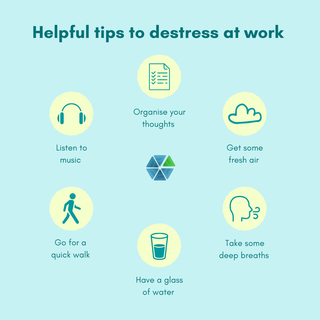Apprenticeships

Stress Awareness Month
Thursday 15th April 2021
Adam Simcox
This April is Stress Awareness Month and in light of the current climate it is vital that we learn how to manage our stress levels in all aspects of our lives.
Stress is a natural reaction to most everyday experiences. When your body releases stress hormones, the same hormones that triggers your ‘fight or flight’ response, your breathing speeds up, your heart rate and temperature rise and your muscles tense. Though this process is intended to protect us, if this reaction occurs at multiple points in the day, it could be very damaging for your health. A high overload of stress can cause headaches, muscle aches, depression, insomnia, fertility problems and high blood sugar and pressure which can lead to an increased risk of a heart attack. In this climate, with most everyday tasks becoming triggers to high levels of stress, it is quickly becoming a great importance to learn how to overcome these stress triggers to lead a healthy lifestyle.
But how can you effectively tackle your high stress levels? Here are some tips to integrate into your everyday life to help you approach those once stressful tasks with a calm and clear mind.
Exercise
The first and possibly most beneficial way to manage high stress is to exercise regularly. When you exercise your body is pumped with endorphins, a chemical in the brain that act as natural painkillers and reduces stress hormones like adrenaline and cortisol. It also acts as a distraction for your worries and thoughts. Scientists have found that regular participation in aerobic exercise has been shown to decrease overall levels of tension, elevate and stabilize mood, improve sleep, and improve self-esteem.1
Sleep
A good night’s sleep revitalizes your mind and body, improving your mood and concentration for the tasks ahead. When you lack sleep, small tasks can seem twice as complex and irritating which will eventually lead you to stress. Approaching stress triggers when well rested allows you to look at them with refreshed perspective.
Take time out for yourself
Often stress is due to an overload of tasks with no real time to stop and relax in between. Taking the time to prioritize self-care and unwind prevents you from being constantly switched on and distracts you from the stressful triggers around you. Taking time out for hobbies or small activities such as reading or listening to music allows your mind to pause and refresh.
Meditate
Two of the main contributors to high stress is increased heart rate and muscle tension. Meditation relaxes your mind and body, slowing down your heart rate and relieving muscle tension which in turn reduces the stress symptoms. Continuous meditation overtime has long lasting stress management benefits, calming your mind and body and resetting your thoughts.
At Oxford Applied Training we have a selection of short courses as part of our Well-being Library that a lot of companies are rolling out to their staff.
contact us To find out more about our staff well-being courses
We can show you how looking after the mental well-being of your staff cuts absenteeism and increases commitment and productivity.

